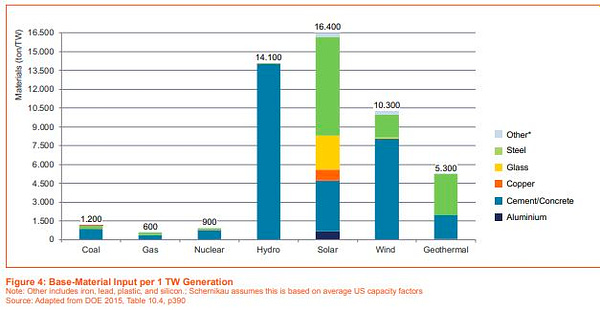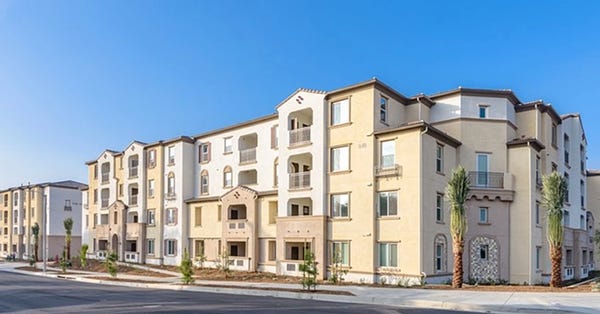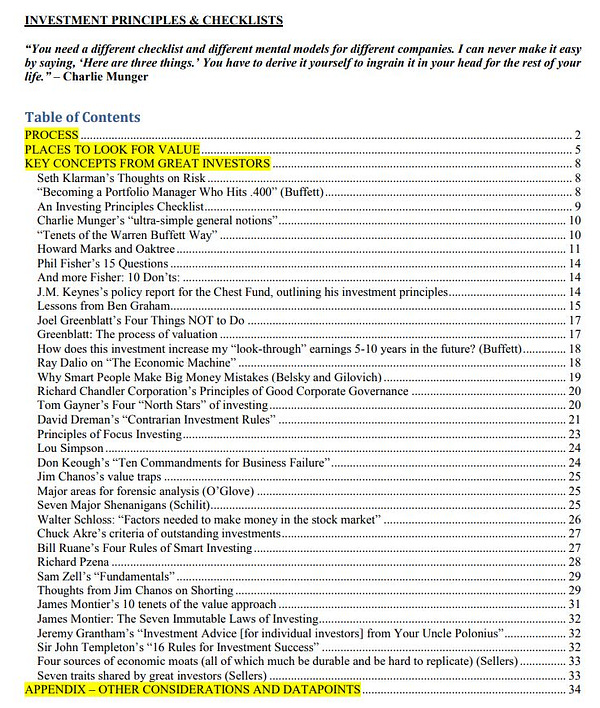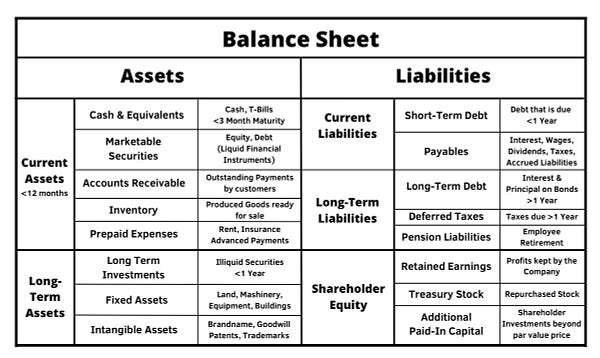The Rational Cloning: Weekly Ideas #38
Diamond Hill and Rhizome Partners Q1 '22 Letters, Tweets That Make You Go… Hmm 🤔
Welcome to the 38th edition of the Rational Cloning Newsletter (Weekly Ideas Series).
Helping you discover the best ideas of others.
Happy cloning.
Weekly Investment Ideas
(1) Diamond Hill All Cap Q1 ‘22 Letter
Among our weakest stocks were Meta Platforms, KKR & Co. and V.F. Corporation.
Meta
The share price of Meta (Facebook’s parent company) declined significantly as the company reported a slight miss in earnings and provided guidance for a weak 1Q22. Meta also highlighted that competition from TikTok has been impacting user engagement in its apps. In our view, the company is taking the proper steps and investing heavily in ramping up its “Reels” feature, which competes with TikTok. Meta’s stock is trading at a meaningful discount to our estimate of intrinsic value, and we expect the company to retain its attractive network economics and manage competition and user privacy concerns well without impairing the value of the business over the long term.
KKR
With private equity firm KKR, investors seemed concerned about the elevated valuations and leverage in private markets, especially during times of equity market volatility. In addition, while KKR’s recent quarterly results were solid, the company’s assets under management (AUM) growth was modest, and earnings were partially driven by a one-time sale of Origis Energy. In our view, the current share price implies flat AUM growth going forward, which we believe is too pessimistic. We continue to believe KKR is well positioned to benefit from institutional investors increasing allocations to private markets and concentrating capital with managers who have strong brands and performance.
V.F. Corporation
Apparel and footwear company V.F. Corporation underperformed due to the longer-than-expected recovery for its Vans brand, elevated freight costs dampening gross margin and its modest exposure to the slowdown in China. The company’s remaining brands are performing well. Although consolidated results have been choppy, we believe management is making the right strategic decisions for future profitable growth.
Others
Other bottom contributors included global consumer apparel manufacturer Hanesbrands and Las Vegas casino operator Red Rock Resorts.
The share price of Hanesbrands pulled back in Q1 due to concerns around the impact cost inflation might have on future profitability despite solid quarterly results and increased longer-term financial targets. As with other apparel companies, the market is growing increasingly concerned with the potential of a consumer spending slowdown and return of promotional activity. Hanesbrands continues to trade at an attractive discount to our estimate of intrinsic value based on the opportunity to grow its Champion brand and for the innerwear segment to consistently achieve modest growth.
Red Rock Resorts’ stock took a breather in Q1—following an extremely strong 2021 return—as Omicron concerns and inflationary risks related to the company’s Durango development weighed on investors’ minds.
(2) Rhizome Partners Q1 ‘22 Letter
Real Estate Updates
a. FRPH
FRP Holdings is likely the best positioned for any environment. The half a billion tons of rock reserves and the trophy waterfront multi-family buildings in Washington, D.C., will perform well in an inflationary environment. Many investors now favor hard assets such as commodities. FRP Holdings’ rock reserves are a commodity that has the added benefit of pricing power. With supply and labor shortages, the replacement cost of the existing buildings has increased. If capitalization rates (cap rates) go up, FRP Holdings can deploy its cash and potentially pick up bargains. We sleep very well with our FRP Holdings position and constantly wonder if we should sell other positions and add to FRP Holdings.
b. Howard Hughes (HHC)
After quickly buying back $250 million of shares recently, Howard Hughes Corporation authorized another $250 million share buyback. During the quarter, the company closed on the sale of the Chicago tower. Higher energy prices mean The Woodlands market is healthier. The company continues to deploy capital into development projects and has recently started to add medical and built-to-rent properties. This will diversify the product types and accelerate the conversion of land into cash generative buildings. Higher interest rates will negatively impact lot sales. But the dual forces of Sunbelt net migration and millennials reaching home-buying age will counter the effects of higher rates. This remains one of the most interesting tug-of-wars in the coming years. The company has become more transparent with valuation and its “unit economic” in development projects. This has made it easier for the buy-side to value the company and track the growth of net asset value (NAV) over time. Under the new leadership of David O’Reilly, the company has cut general and administrative expenses by $68 million, sold non-core assets, and increased investor outreach. If Howard Hughes continues to buy back shares after this new round of $250 million authorization, we will be more bullish on the stock, since each dollar of buy-back immediately creates 70-100% of value and removes sellers.
c. CLPR
Clipper bought another project on Dean Street, right next to 1010 Pacific Street. To our surprise, the company announced that the 1010 Pacific Street building may be completed by year-end 2022. This new multi-family building will be delivered into a red-hot rental market. Unlike some smaller, mom and pop developers, Clipper has executed and moved quickly on this project. New York City apartment rents continue to reach all-time highs. As leases expire in 2022, we believe rent increases will be in the double digits. We believe that Clipper will eventually re-rate because it will trade close to a 6% cap rate upon stabilization in 2023, too cheap for a multi-family REIT. In the coming months, when other buyside analysts receive rent increase notices from their landlords, the Clipper thesis will really hit home. In theory, cap rates can rise higher than 6% in the future. In practice, developers cannot profitably build new supply if cap rates are 6% due to New York City’s unique land constraints and difficulties in permitting and construction. Without new supply, rent growth should result in a stabilized cap rate higher than 6% over time.
Non-Real Estate Updates
Ardagh Metal Packaging
Our exposure in Ardagh Metal Packaging has been largely in five-year warrants. We added exposure in the common stock, since the company recently announced the initiation of a sizable dividend in 2022. We like the dividends because they allow us to create our own style of share buybacks. Although Berry Global is cheaper today both on EV/EBITDA and P/FCF basis, the 2024 EV/EBITDA multiple will be roughly the same. We prefer the long-term secular trends, growth rate, and sustainability of aluminum cans over plastic packaging. We believe the market will rightfully reward a higher terminal value to Ardagh Metal Packaging.
Staffing Companies (Cross Country Healthcare, HireQuest)
During the quarter, we increased our allocation to the two staffing companies.
Cross Country Healthcare sold off upon the announcement of the CEO’s transition to chairman. We believe this will allow Kevin Clark to focus on strategic decisions and delegate the day-to-day operations to the new CEO. Cross Country is an asset-light business trading at an estimated 10 times normalized P/FCF and roughly 7 times 2021 P/FCF. The key risk is that hospitals will stop using staffing companies to fill nursing needs and move the function in-house. This is typical drama within the nurse-staffing business every few years. Given the current nursing shortage, we believe this risk is low and Cross Country will continue to play a significant role in nurse staffing.
We increased our allocation to HireQuest to over 4% of our partners’ capital. Our channel checks keep coming back with happy franchisees. Feedback includes better support from the franchisor, excitement to expand branches, and operational support to empower franchisees to focus on staffing. We called so many franchisees that the corporate office asked us why we were bothering their franchisees. We take this reprimand as a badge of honor. We believe that HireQuest may become an asset-light compounder with an impressive CEO. But staffing is a cyclical business, and we are positioned to add to our position in case of a sell-off.
Univar Solution
Univar Solutions reported excellent results for the full year of 2021. More important, the company guided to $860-$890 million of EBITDA and $430-$445 million of free cash flow in 2022, with a net debt/EBITDA ratio between 2.0-2.5 times. The year 2022 will be the first normal year without any integration-related costs. We estimate that our cost basis in Univar is roughly 5.7 times 2022 P/FCF, with some lots purchased as low as 3.4 times during the Covid lows. We wish every high-quality business in our portfolio could be bought as cheaply as Univar.
Houghton Mifflin
We allocated a two percent position in Houghton Mifflin after Bloomberg reported that the company is exploring strategic alternatives. Shares barely reacted on the news. Houghton Mifflin is an education company that has successfully transitioned from the print business to a SaaS business. We also expect large federal stimulus that will benefit curriculum spending in the next few years. We bought shares at $17 and believe that intrinsic value is in the high $20s. The private equity firm Veritas emerged as the buyer with a $21 per share tender price. We quickly sold our shares and bought some calls in case there is a higher bid. Given the rate increase backdrop in 2022, we will focus on more event-driven ideas such as Houghton Mifflin.
Tweets That Make You Go… Hmm 🤔


















Always looking forward to this series.
Would you mind sharing your thoughts on META with the length of a tweets worth of words ?